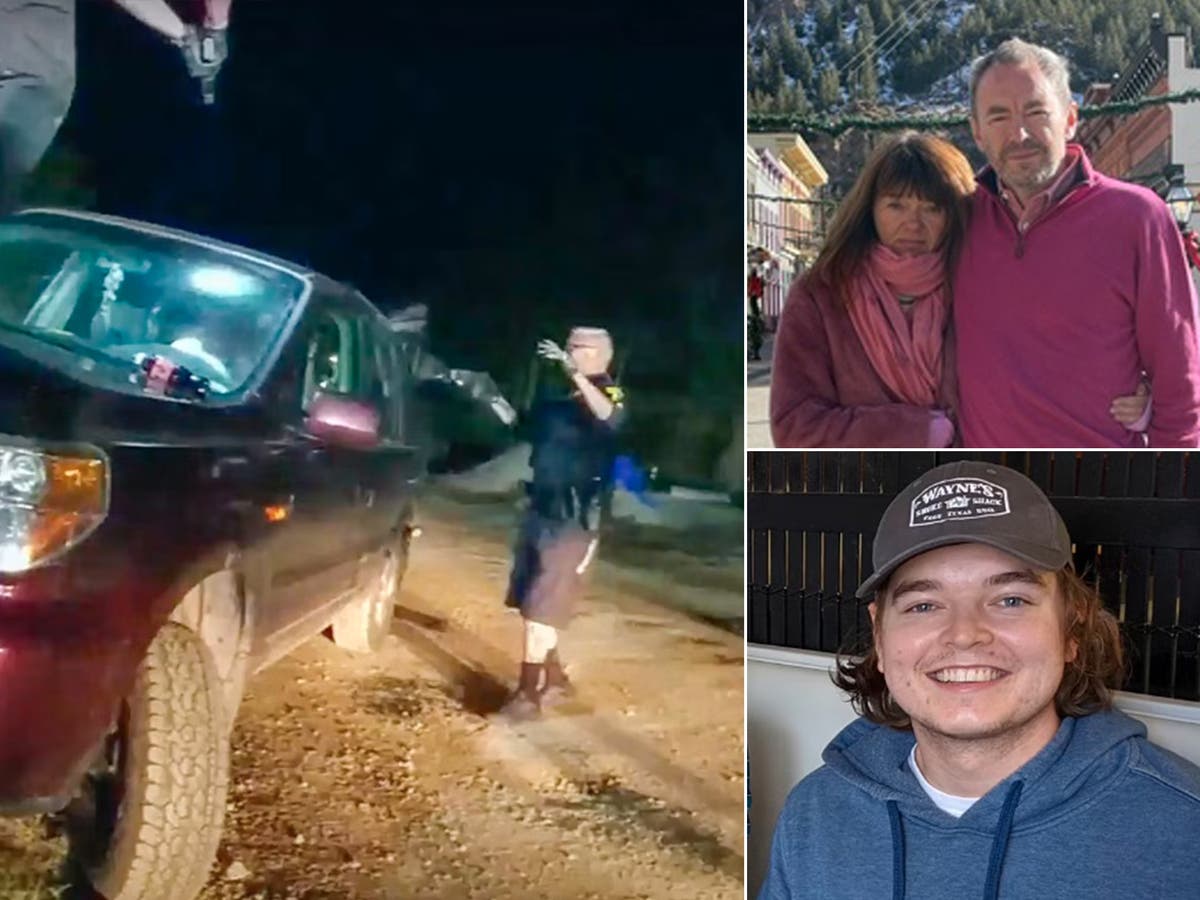The former deputy who shot and killed Christian Glass after the 22-year-old called 911 for help after being stuck on a road has been found guilty of reckless endangerment — but the jury was hung on high charges of murder and misconduct.
His mother, Sally Glass subtly shook her head in the front row of the courtroom galley as a Colorado judge discharged the 12 jurors who found Andrew Buen, the man who fatally shot her son, guilty of reckless endangerment – but could not come to a decision on the second-degree murder and 1st-degree official misconduct charges against him.
She clasped hands with supporters behind her as she sat stoically next to her husband, Simon, as the court heard the verdict.
Clear Creek County District Attorney Heidi McCollum told reporters outside the court that her office was still deciding whether to retry Buen on the other charges. He is next due in court again on Monday for discussions about sentencing and procedure going forward.
It was a verdict that came after nearly two years of a painful struggle for justice by the Glass parents, who were determined to not only set the record straight about their son’s killing but also fight for changes – in the hopes of saving other families from similar agony. They never expected to be put in this position; from England and New Zealand respectively, they’d always had utter faith in the police — until they were notified in June 2022 about their son’s killing.
Their efforts already resulted in apologies and a $19m settlement from Colorado agencies, the largest in state history, which also mandates enhanced crisis response and de-escalation training for law enforcement.
As they stood outside the courthouse this week, Sally and Simon were 3.5 miles away from the sleepy site on an unpaved mountain road in Silver Plume, a tiny old mining town with little more than a few homes, a coffee shop and a handwritten ‘Kids & Dogs’ sign greeting visitors off the highway. Christian became stuck there on rocks there late at night on 10 June 2022, calling 911 for help when he couldn’t move his vehicle in the deep rural darkness at an elevation of more than 9,000 feet.
During the phone conversation, he appeared to be suffering some type of crisis and not making sense, mentioning things like folkloric figures and possibly following a car. When asked if he had weapons in the vehicle, the amateur geologist responded that he had two knives, a hammer and mallet that could be considered weapons, offering to throw them out of the car. Dispatch sent officers on a motorist assist call.
Buen and his shift partner, Tim Collins, were first to arrive, and bodycam footage shows Christian telling the pair that he is scared – but Buen almost immediately begins ordering him aggressively out of the car. When Christian again offers to throw the knives and items from the vehicle, Buen barks at him not to. For more than an hour, as Clear Creek officers are joined by five other officers from four different agencies, various gentler tactics are made to remove Christian from the agency; he repeatedly makes heart signs with his hands, and much of the bodycam footage shows officers just chatting and milling around.
The vibe instantly and almost incomprehensibly changes after an hour, however, when Buen – who’d earlier obtained permission from his remote supervisor to breach the vehicle – leads an intensified effort to do so. Christian panics and becomes more agitated as officers swarm the vehicle, shouting. He screams and writhes as they deploy bean bag rounds and tasers, breaking the window behind Christian in the driver’s seat; he picks up a knife he’d repeatedly offered to throw out and thrashes towards the window behind him.
Buen fires five shots into the car and kills him.
Buen was later charged with second-degree murder, reckless endangerment and official misconduct; he pleaded not guilty. His remote supervisor, Sgt Kyle Gould, pleaded to a lesser charge of duty to intervene and his been stripped of his peace officer certification in Colorado. Both were terminated by Clear Creek following the charges.
The six other officers who responded to Christian’s 911 call have also been charged with duty to intervene.
Jurors began deliberations on Wednesday in Buen’s trial after hearing more than a week of evidence from prosecutors and defense attorneys. The county courthouse in Georgetown is tiny, adjacent to the sheriff’s office and jail — along with the two-cell two-cell old stone jail dating back to 1883 abutting the street with an historic plaque. All of that is directly across from the district attorney’s office in a town known mainly for a tourist train and Guanella Pass; some homes are older than the state itself.
It was here that jurors heard opening arguments on 12 April, differing prosecution and defense narratives that ultimately led to the same undisputed conclusion: Buen shot Christian dead just over an hour after arriving on scene in response to the 22-year-old’s own 911 call.
The prosecution was led by Clear Creek County District Attorney Heidi McCollum, a lawyer with ramrod-straight posture and an academic energy leading a buttoned-up, suited and serious team. The defense was helmed by Carrie Slinkard, a dogged opponent with blunt delivery, who runs a law firm specializing in defending law enforcement.
“Keep in mind that, throughout this trial, that Christian Glass was the one who called for help,” DA McCollum told jurors in opening. “He mistakenly thought that, when he needed assistance, police would do just that.”
Instead, she said at the trial’s start, Buen’s actions were “aggressive, excessive and criminal” – and Christian “spent the last hour and a half of his life in absolute fear.”
For the duration of proceedings, the prosecution argued that Buen, though trained in de-escalation tactics, remained intent upon an unjustified removal of Christian from his vehicle while responding to a motorist assist call. McCollum told jurors that a visibly terrified Christian had complied with Buen’s orders; when he offered to throw out two knives, a hammer and mallet that were in the car, Buen told him not to.
Witnesses included use-of-force expert Seth Stoughton, who testified prominently in the George Floyd trial, as prosecutors laid out a case that Buen had mishandled and criminally escalated the case by insisting that Christian – who, while initially cooperative, became less responsive – was suffering from some sort of mental health crisis.
Chief Deputy District Attorney Steve Potts reminded jurors, just before they were sent to deliberate, to consider officer-created jeopardy – a situation in which an officer “precipitates” the need to use action that causes the injury or death of a person.
The case, he said, involved a “super-frightened boy in a car telling them that he didn’t want to get out of the car.
“One of the first things he said to Deputy Collins when they arrived was, ‘You’re not going to shoot me, are you?’ Well, you know what? They did,” Potts said Wednesday. “They shot him. They shot him to death.
“He said he’s scared, he said he needs other people there … whether this was drugs mixed with psych issues, whether it’s a psych issue only, does it really matter? He was in a crisis of some kind. Is this how we expect people in crisis to be treated? To scream and yell at them, to shine flashlight into their face, to stand up against the window … while he’s in the car with his hands above the wheel, terrified?”
The defense, instead, accused the prosecution of conducting a shoddy investigation, positing that Christian had been intoxicated and may have been driving dangerously before the call. They referred to confusing statements he made in the 911 call, presenting a theory of a phantom car that could have been involved while arguing that Buen was taking into account public safety – and, then, concerned for the welfare of other officers at the scene.
While Buen and his shift partner, Tim Collins, arrived first on scene on 10 June, they were soon joined by five other officers from Georgetown, Idaho Springs, Division of Gaming and State Patrol. Other officers tried coaxing and joking with Christian; much of the bodycam footage depics a slow-paced, casual scene.
Only when Buen – who “ran that scene,” McCollum said in closings – insisted upon breaching the vehicle did Christian panic and the situation escalated in a fast and deadly manner. Officers tased Christian and shot him with bean bag rounds, the window behind the driver’s seat breaking. As Christian thrashed and “screamed in agony,” as Potts said during closings Wednesday, he grabbed the knife he’d previously offered to toss from the car.
“And as Christian is being attacked in the only place that he felt safe that night, he’s sitting in the driver’s seat, one of the tasings comes from behind him; he takes the only thing he has in his hand, which is that knife which Mr Buen told him to keep, and he turns around and he reaches out the back window – and he can’t bend his arm past the metal or the steel frame of the car,” McCollum said in closing arguments. “That’s what Mr Buen would like you to think, but [Christian] can’t … like any animal in a cage being attacked, trying to protect the only thing it has, its own person, its own physical body, Mr Buen shoots and kills him.”
Defense attorney Slinkard, however, reminded jurors that Buen said in his interview in the immediate aftermath – which was shown to the court – that he believed the life of Georgetown Marshal (also called Police Chief) Randy Williams, who was tasing from that back broken window, had been in jeopardy. During closing arguments, she played and replayed for the jury portions of the bodycam footage that she argued proved Christian had made contact with the taser and been within reach of Williams, causing him to jump back.
“It wasn’t until the knife in Mr Glass’s hand went outside that back window as the chief is standing right there that shots are fired,” she argued.
No one but those on scene that night, she argued, could hear, see and smell the conditions on the evening, pointing that none of the other officers had given testimony.
“There were explanations, you just didn’t hear any of them, because she didn’t put any of those witnesses on the witness stand,” Slinkard said. “You cannot infer that he is guilty of murder because other people made a different decision when they were standing in different places, looking at different things and had different backdrops at the time.”
Mr Potts followed her and directly addressed those officers – pointing out key reactions captured in video and audio.
“ Mr Buen says, ‘He went for you Williams, right?’” Potts said Wednesday. “Because he didn’t know whether he went for him or not.”
Then he reminded jurors of the response of Buen’s shift partner, Collins, in the seconds after the fatal shots were fired.
“Oh god,” he cried out. “What did we just do?!”








